Trending
Opinion: How will Project 2025 impact game developers?
The Heritage Foundation's manifesto for the possible next administration could do great harm to many, including large portions of the game development community.

Featured Blog | This community-written post highlights the best of what the game industry has to offer. Read more like it on the Game Developer Blogs or learn how to Submit Your Own Blog Post
More often then in other mediums, games are delayed months or years as teams learn what it is they're making. By looking at the exploratory nature of games and acknowledging the need to throw out work to find a good design, let's minimize our losses

More often then in any other medium, games are delayed months or years because a team didn’t know what they were making. Sound familiar?
This happens to so many developers, including myself, because of how much time, energy and thoughtfulness it takes to make a good game. Let’s look together at why it takes so long.
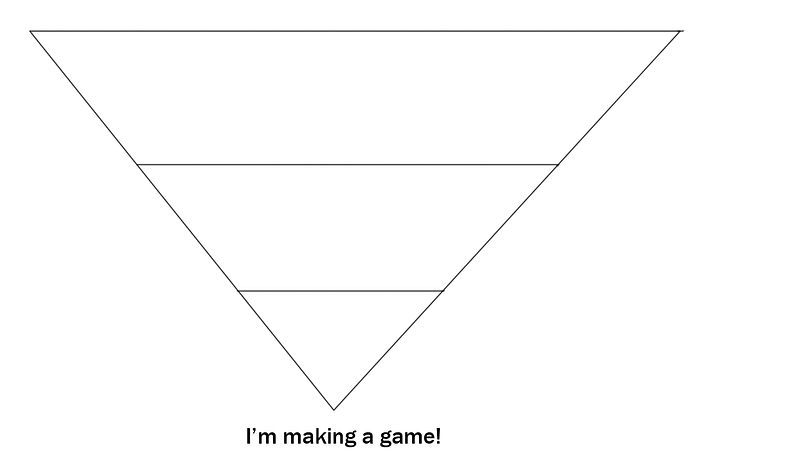
Here we are. We’ve made the brave and totally fiscally responsible choice to make a game. This is a big decision that will impact the next few years of our lives, but we are not afraid. Let’s embark up our brittle pyramid.
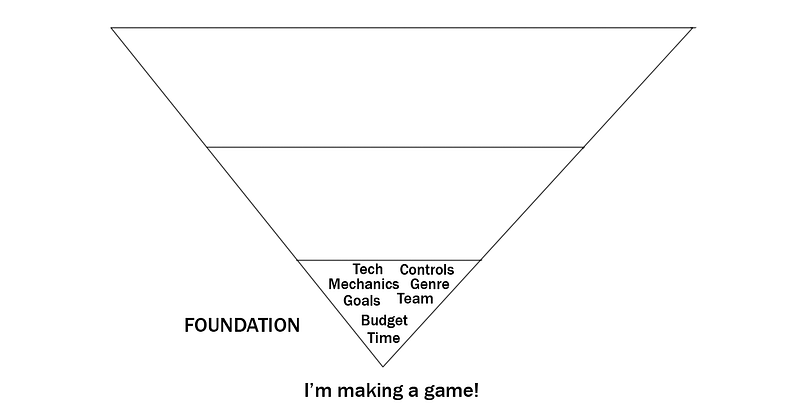
First we need to build a Foundation with some big choices. Slightly smaller than our decision to make a game maybe, but still big.
What are our goals?
Who will we work with?
What is the game we want to make?
What tools will we use to make the game?
How much time and money will we spend?
I call these questions Foundations because they impact every aspect of a game as it’s made. Whether we ask these questions or not, their answers will still affect our game. Terrifyingly, our answers to all of these questions can change. Keep that in mind as we keep going up.
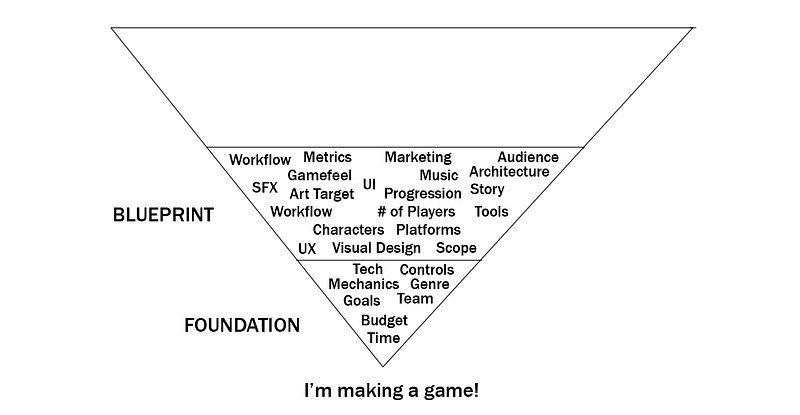
With our Foundation in place, we can rough out a Blueprint for the game we’re making by asking yet smaller questions.
What is our game’s art style?
How is our game’s code structured?
What platforms will our game be on?
How much content will our game have?
These questions decide what your game looks, feels, sounds like, how you’ll market it and how it’s built. Like our Foundation, this Blueprint has a big impact on what our game will end up being, but we have a bit more flexibility in changing these decisions later on. There’s only one more level to the pyramid.
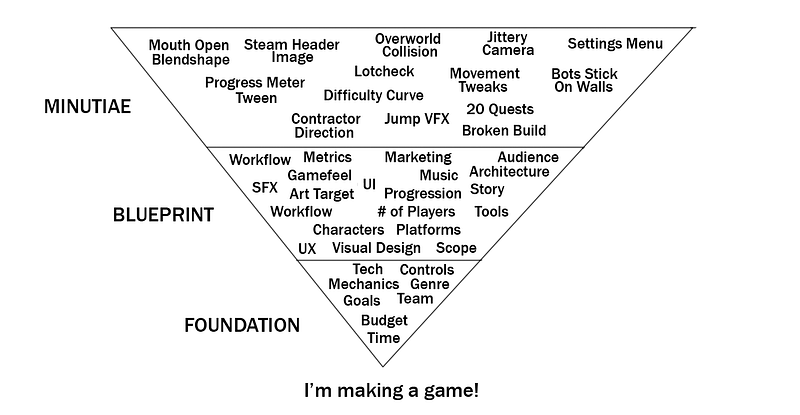
Minutiae is a perfect word to describe the millions of tiny decisions we make as we build out from the Blueprint we’ve made.
How long does it take to unlock everything?
Oh oops, I broke the build. What was it this time?
What else should we layer over that jump sound?
Which font should we use for the Steam Store header?
What resolution is this wood texture? Does it tile seamlessly?
Minutiae is what makes games so hard to make and why so many games end up taking longer than expected. And it’s not just that there are millions of these tiny questions to answer. Often, we can’t test whether our answers to the earlier, bigger questions were good until we’re deep down into the Minutiae.
And going back down a level in this pyramid to revise our answers is insanely expensive. Adjusting our Blueprint can throw away hundreds of hours in the Minutiae spent trying to prove out the last Blueprint. If your project is exploring new ground even a little bit, finding solid footing here can start to feel like an endless cycle (see Tumbleseed, The Witness or Anitchamber).
Going down another level is even more dangerous. If our Foundation changes that can challenge the entire project and can sometimes lead to completely starting over (as was the case with Overwatch). The worst part is, there are so many ways this can happen and we can’t control for all of them. If we go far over budget, forcing cuts to mechanics and content, one could argue the producers should have scoped smaller. But if our team’s only artist gets hit by a bus, or is offered a dream job, our only option is to try and find someone to replace them ASAP. Any project you’ve heard of that took 5+ years to make rebuilt their Foundation. Probably a few times.
The idea I want to end on is that this model applies outside of games too. As we work on our game, life is still going on and has it’s own Foundations, Blueprints and Minutiae.
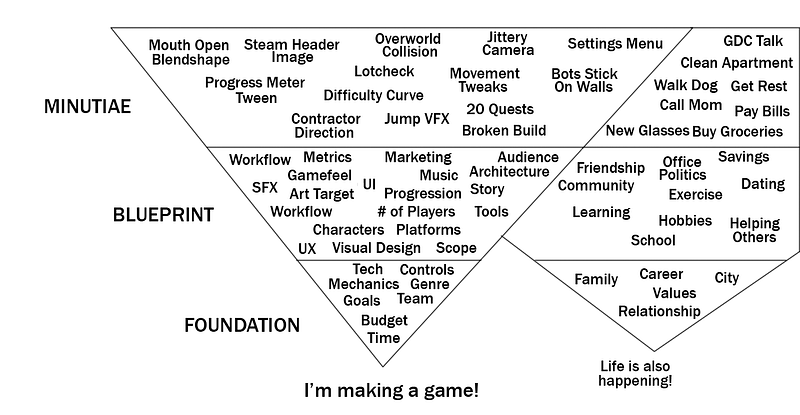
If we change the pillars we’ve built our life around, that upends other decisions we’ve made and forces us to rebuild. Changing careers may require going back to school or finding a new community.
Big changes in our lives also affects our game’s pyramid. Ending a relationship or moving cities can break our game’s Foundation or call into question the Blueprint we’ve built and all the Minutiae we’ve endured so far. If we’re not careful, making our game can also have a negative affect on our life. Crunch, which usually includes neglecting friends and family, happens when you (or your employers) don’t keep these pyramids separate.
Budget time in your schedule for prototyping and the failures needed to find your game. If you don’t, your schedule is a lie.
Going in with a prototyping mindset will let you recognize problems in your Foundation and Blueprint earlier.
Sometimes you have to get deep into Minutiae before you can judge quality.
Each level of the pyramid works your brain differently. In addition to this cost of throwing away work, transitions between these decision-making scopes has a cost too.
Be careful to keep time to manage your life pyramid separately from your game’s pyramid or you risk the two mixing together. That lets work get in the way of living life and vice versa.
Read more about:
Featured BlogsYou May Also Like